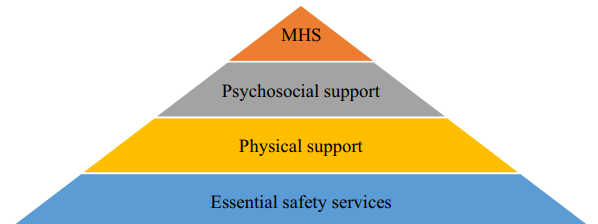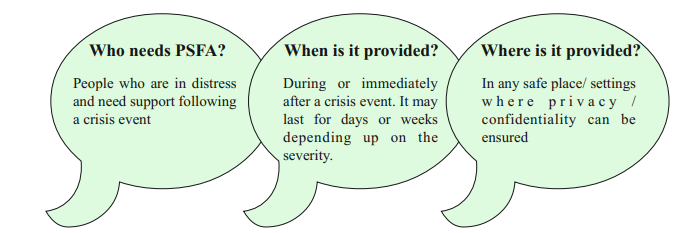Psychosocial First Aid Strategies
Psychosocial First Aid Strategies
Psychosocial First Aid (PSFA) is an immediate intervention in the aftermath of any disaster. It can be administered within the first few days of the disaster to three weeks by any person with a minimum or no education. It is practical help provided on a humanitarian basis in a supportive manner to the affected person/family/community. After any disaster, it is also important to observe that along with the physical (e.g.,fractures, injuries, malnutrition, etc.) and psychological (e.g., shock, sadness, fear, anger, etc.) consequences, social (property loss, loss of job, risk of migration, increase in crime rates) consequences also affect the lives of the people. The physical, psychological, and social consequences are interlinked.
- While returning home from work, lightning struck Manohar and he was severely burnt and hospitalized. His family was in distress and not able to afford the treatment.
- Due to the heavy rainfall, in many areas of Cuddalore, Tamil Nadu, the paddy fields suffered a severe loss of several crops. Farmers were in a state of shock and anger due to loss.
- 11-year-old male child lost his books and toys in the Floods and is unable to sleep. He is unwilling to go to school without his books
While providing PSFAsupport services are provided immediately after a disaster, the above illustrations clearly indicate that the physical, psychological, and social consequences require simultaneous and equal attention
The idea behind PSFA comes from crisis intervention (helping people to address psychological reactions following a crisis); physical first aid (process of providing immediate assistance to a person suffering a sudden injury, illness and/or bodily reactions); and social interventions (connecting people to the available support with family, friends, relatives, and community) which can be performed by a non-expert.

| PSFA | PSFA DOES NOT |
|
|
Psychosocial needs of the affected people
Disasters induce stressful reactions. Psychosocial First Aid is an instant intervention provided in disaster-affected communities to help individuals/ families/ community mitigate these stress reactions. Let us consider that in a community affected by disaster, there are 100 people. Among these 100 people, around 30 to 50 would suffer from moderate to severe psychological distress. The distress created after any disaster can be minimized by strategies to promote family or community support. Around 15 to 20 people might develop mild to moderate mental disorders.
It is essential to focus on those people using appropriate psycho social support services to prevent further worsening. Only 3 to 4 might suffer severe mental disorders, and such individuals need to be identified early and referred for mental health treatment. But all the 100 individuals would require basic amenities and services to ensure their safety and security. A larger proportion among them will require it either physical, psychological, and social support individually or inter dependently.

PSFA should aim to provide fundamental necessities and essential safety, physical psychological and social support leading to a gate way for higher order interventions of Mental Health Services. The pyramid of psychosocial needs clearly explains the earlier description, and its requirement for the entire community as prescribed in the National guidelines on PSS and MHSs of the NDMA, MoHA, GoI.
Pointers to identify the persons requiring higher interventions
As already mentioned, not all persons might need higher interventions. The following factors would help care providers to know who would need PSS/MHS:
- Age
- Gender
- Marital status
- Educational attainment
- Sexuality
- Personality
- Disability
- Socio-economic condition
- Nature of the disaster
- Culture and traditions
- The severity of the disaster
- Stressful experiences in the past
- Coping skills
- Availability of support
- Past and present physical and mental health conditions
- Family history of physical/ mental illness
The pointers mentioned above decide the level of vulnerability and risk a person might have after any disaster. Along with the bio psychosocial pointers discussed previously, if a person has a severe injury; is highly suicidal; causes harm to others; and is not able to take care of her self/ others; such individuals might need advanced care and not PSFA.

Action Principles of PSFA
- KNOW (about the crisis event, available resources & materials and protection and security concerns).
- PREPARE (ensure safety, observe people with urgent basic needs and people with severe distress reactions).
- HEED (listen to people who might need support, enquire about needs and concerns and make them feel comfortable).
- CONNECT (provide basic needs and accessibility to services, adequate information and social support, better coping abilities).
Remember Four A’s for PSFA:
- Attending to disaster survivors with professional humane behaviour, e.g., being honest, respecting the person, avoiding prejudices/ personal bias, providing reassurances, and facilitating ventilation.
- Avoiding non-professional behaviours like asking for personal assistance, making non-formal relationships, providing false information, pressurizing people to talk, not conforming to local traditions or culture, and being judgemental.
- Adhering to the cultural sentiments and practices of the community and ensuring confidentiality.
- Abiding by the guidelines and giving priority to vulnerable groups, ensuring respect and dignity, foster autonomy with dependence while working with vulnerable groups
Key components of PSFA
- Assess the urgent needs (food, medical, safety, immediate emotional reactions, etc.).
- Safeguard from further damage (shifting the affected people to the safe places, medical services, etc.).
- Provide help for survival (financial support, basic facilities, etc.).
- Listen and console (understand the problem and provide assistance accordingly).
- Impart knowledge on how to deal with the problems effectively (seeking help, looking for resources/ strengths).
- Link to different sources of support (educational, health, community, religious institutions, etc.).
- Teach about normal and abnormal reactions.
Last Modified : 11/23/2023
Ministry of Social Justice & Empowerment's 24x7 To...
This topic provides information about the importan...
Tips for handling mental issues during pandemics/d...
World Suicide Prevention Day (WSPD), on 10 Septemb...
